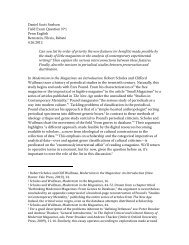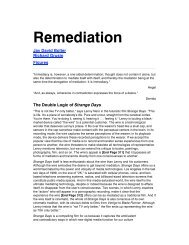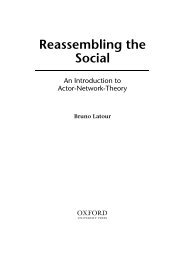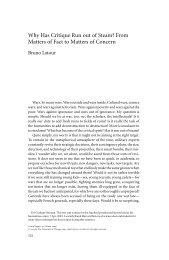The Exploit: A Theory of Networks - asounder
The Exploit: A Theory of Networks - asounder
The Exploit: A Theory of Networks - asounder
You also want an ePaper? Increase the reach of your titles
YUMPU automatically turns print PDFs into web optimized ePapers that Google loves.
38 Nodes<br />
A mode <strong>of</strong> individuation may produce a distinct person, a mass <strong>of</strong> people,<br />
a nation - state, a corporation, a set <strong>of</strong> gadgets, animals, plants, or any formation<br />
<strong>of</strong> matter.<br />
Subjects as individual people, then, are particular modes <strong>of</strong> individuation<br />
to which sets <strong>of</strong> values are ascribed: agency, autonomy,<br />
self - consciousness, reason, emotion, rights, and so on. Although “individuation”<br />
is a well - worn philosophical concept, in the context <strong>of</strong><br />
the control societies, individuation is assumed to be continually modulated,<br />
precisely because it is informatic, statistical, and probabilistic.<br />
Perhaps it is best to define a network as a mode <strong>of</strong> individuation? But if<br />
so, how is a network individuated? What makes a network “a” network?<br />
What is the “circumference” <strong>of</strong> a network?<br />
<strong>The</strong>se almost geometrical quandaries become even more relevant<br />
when couched in the language <strong>of</strong> political philosophy: What is inside<br />
a network? What is outside? This is not simply a question about who<br />
gets access to a network or about who decides what to include or<br />
exclude from a network. Such an approach presumes the prior existence<br />
<strong>of</strong> a network, and then, only after this, is access or inclusion<br />
raised as a problem. Instead, the question <strong>of</strong> individuating a network<br />
is really a problem <strong>of</strong> establishing the very conditions in which a network<br />
can exist at all. It is, in other words, a problem <strong>of</strong> sovereignty.<br />
Traditional concepts <strong>of</strong> sovereignty are <strong>of</strong>ten juridical in nature—<br />
that is, they define sovereignty as the ability to exercise control over<br />
bodies and resources based on law, or, as Foucault put it, the authority<br />
to “take life or let live.” By contrast, contemporary political thought<br />
<strong>of</strong>ten defines sovereignty not as the power to command or execute a<br />
law but as the power to claim exceptions to the rule. 11 <strong>The</strong> sovereign<br />
ruler occupies a paradoxical position, at once within the law (in that<br />
the ruler forms part <strong>of</strong> the body politic), and yet outside the law (in<br />
that the sovereign can decide when the law no longer applies). Sovereignty<br />
is, then, not power or force but the ability to decide—in<br />
particular, the ability to decide what constitutes an exceptional situation,<br />
one that calls for a “state <strong>of</strong> exception” and a suspension <strong>of</strong> the<br />
law. 12 But it is not always clear where the line between “exception”









